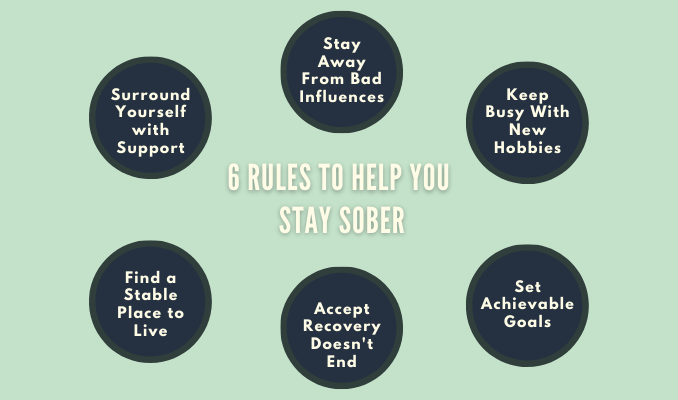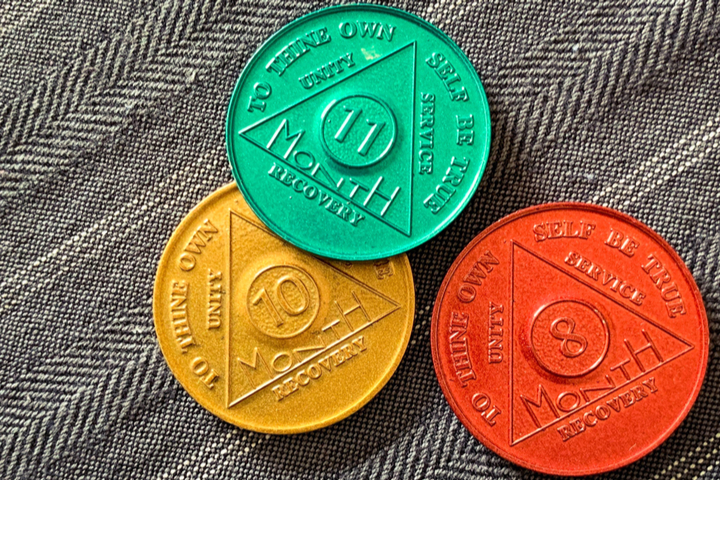How To Stay Sober After Rehab?
Table of Contents
Finding the courage to seek help for your problems with substance abuse and the determination to start your journey to recovery are some of the most difficult things you’ll ever have to do. Not many people can openly admit to their weaknesses and vulnerabilities, which is why so many people around the world still struggle with addiction.
However, if you worked the program and are currently sober, then you know how much effort it took to get where you are today. Recovering from your addictions is something you should be immensely proud of, and you’ll, no doubt, want to do everything in your power to avoid the possibility of a relapse.

How You Can Stay Sober After Rehab
While some will claim that getting sober was the hardest thing they did, others believe staying sober is the true challenge. Although addiction treatment programs are there to help individuals get clean, it’s all about what you do after you complete the program and how you utilize the tools you’ve learned in order to stay sober. It’s not always easy to return back to society and establish new routines after treatment, and if these individuals don’t practice what they learned, they could wind up going back to their old habits of substance abuse.
When you’re fresh out of treatment and feeling confident in your new skills, it may seem like a relapse is a very last thing that can happen. Unfortunately, relapse is a very common thing for those who are new to recovery and occurs more often than you think. In fact, The National Institute on Drug Abuse states that relapse rates are between 50 and 90 percent for recovering alcoholics and 40 to 60 percent for recovering drug addicts.
These statistics are staggering, but they shouldn’t discourage you because every person’s recovery journey looks different. To help avoid the possibility of relapse, those who are newly sober are always encouraged to utilize support services and 12-step programs.
More often than not, it takes a lot more than willpower to avoid the slippery slope of relapsing. Here, we’ve defined six rules that can help you on your journey to sobriety after rehab.

1. Find a Stable and Safe Place to Live
Before leaving rehab, it’s important to think about your current living situation. Is your home and its surrounding environment suitable for recovery? Your home environment plays a very important role in your ability to stay sober after rehab and is something that should be taken into consideration before you complete your treatment.
Your home needs to be a safe and stable place that promotes wellness and sobriety. If you don’t believe your current residences provide those things, then it might be time to look elsewhere. Oftentimes, one’s environment has a lot to do with their unhealthy habits of substance abuse, and it’s better to remove yourself from those situations than risk a relapse. This is especially important if your home is a trigger for you or you live with someone who shared the same unhealthy habits with you.
We understand the stress — mentally and financially — that moving can cause. But when it comes to your sobriety, a new living environment is truly worth every penny. However, if you’re unable to afford a new place or aren’t sure if you’re ready to live on your own, there are other options to consider.
Sometimes, it might be best to move in with your parents or family members until you feel confident enough to live on your own. This may seem like you’re taking a step backward, but it’s actually a step in the right direction on your journey to recovery. Additionally, some addiction treatment programs offer sober living communities that help patients assimilate better into society once they have completed treatment. Check with your rehabilitation facility to see if this is a potential option for you.
Establishing good and healthy habits in your life is an essential component of maintaining your sobriety and avoiding relapse. The first step in ensuring this is to find a stable and safe place to live when you leave rehab. It may be a challenging and stressful transition, but it’ll be well worth it when you live in an environment that isn’t filled with triggers and stressors.
2. Surround Yourself with People Who Support You
Attending treatment and working on your sobriety is like getting a new chance at life. The last thing you want to do is throw that second shot away by returning to your old habits and old surroundings. More often than not, the people we associate with have a lot to do with how we lead our lives. In the case of those in recovery, the people they used to hang around with often influenced and enabled their substance abuse.
After you’ve completed the rehabilitation program, it’s important that you avoid any potential triggers — even if that means you have to distance yourself from the crowd you used to spend time with before entering treatment. Letting go of a friendship is never easy, but if they were contributing to your substance abuse, were they ever your true friends to begin with?
Surrounding yourself with people who are loving and supportive will make all the difference during this critical time in your life. You’ll find that it’s so much easier to stay sober when you have a team of people by your side who have your best interest at heart.
So, take your time and think about it. Who should be a part of your support team?
Of course, this will depend on who is currently present in your life and how willing they are to provide their support despite your past indiscretions. If these people are in your life, then you’ll want to have the following services as part of your support system:
- Your parents
- Close family members
- Your siblings
- Your close friends
- Your counselors/therapists
While your friends and family are essential to your recovery and your support network, they don’t always understand the full extent of addiction and recovery. Their love and support — although strong and unwavering — will have their limitations. They can only understand so much about your recovery journey. That’s why we recommend joining a local addiction support group.
Support groups can be a great asset to your recovery because they are filled with like-minded people who have been in your shoes and, most importantly, know exactly what you are going through. Sober friends know how to be there for you and can help you maintain your sobriety on those difficult days.
If you’re the lone wolf type, we understand that it might be difficult to rely on other people for their support. But you have to remember that it’s nearly impossible to stay sober on your own.
When the going gets tough, you’re going to need people by your side to help you through.

3. Stay Away from Old Friends and Bad Influences
Although we mentioned that your close friends should be a part of your support system, it should be said that these close friends should be the ones who respect your sobriety and want what’s best for you. They should not be the people you used to associate with during your days of substance abuse — i.e., your former drinking buddies or drug dealers.
We understand that starting over isn’t easy, and it comes with challenges, but you can’t make a fresh start for yourself and your sobriety if you go back to the life and the people that influenced your addiction. For the sake of your sobriety, you have to cut ties and stay away from any of your old friends who were bad influences.
More importantly, you need to stay away from the people you abused substances with — friends or not. More often than not, these individuals will try to manipulate their way back into your life once you’re out of rehab.
If you make the decision to live in the same area you were in before rehab, avoiding these people will be very difficult and maybe even impossible. Not to mention, it’s completely unfair for you to feel like you need to live in fear of running into your past while you’re working tirelessly on your present and future.
As we mentioned before, moving away from your old environment may be your safest bet. By doing so, you won’t have to worry about being near the people who encouraged your bad habits. While this solves the in-person communication problem, you will have to be strong in enforcing tight restrictions on any phone communication with your former friends.
4. Keep Busy with New Sober Hobbies
One important thing that many people overlook coming out of rehab is the amount of time they have on their hands. Being newly sober, they are facing the reality of their past actions and are quickly realizing how much time was really spent using drugs or binging on alcohol.
Unfortunately, with more time to spare, boredom can set in quickly: and there’s nothing more dangerous than someone who is bored, a recovering addict, and has time to waste. What’s that old saying, “Idle hands are the devil’s workshop?”
Keeping busy and setting a routine for yourself is important to do when you leave rehab. You want to make sure you’re spending your days doing fulfilling and constructive things that will also help you keep your mind off of your triggers and any form of craving. Now is the time to shop around for hobbies and discover new activities that bring you comfort and joy.
Filling up your calendar with new sober hobbies is a great start to the rest of your recovery. Here are some options to add to your potential list:
- Reading
- Exercising
- Yoga
- Meditation
- Volunteering
- Play video games
- Gardening
- Writing/journaling
- Join an intramural sports team
- Painting/drawing
- Cooking
While finding new hobbies is exciting, it’s important that you go about everything in moderation. By overloading yourself, you may risk burnout, or you could develop an unhealthy obsession — replacing one addiction with another. Balance your schedule, make time for yourself, and make sure you find activities that are healthy to partake in and make you happy.

5. Set Achievable Goals for the Future
Since you had the strength to take matters into your own hands and sought out treatment for your addiction, you now have a fresh start and a new beginning in life. Your decision to get sober enabled you to have a future — sadly, something too many struggling addicts don’t get a chance at.
Now that the future is yours, you have the ability to do whatever you want (in safety and moderation) and be who you want to be. Now that you finished rehab, you have the opportunity to pursue new things and improve your life. Take some time and think about what you want for yourself next. What are some achievable goals you can set for the future? Here are a few examples:
People set all kinds of goals for their future when they emerge from rehab. Your list of goals can look something like this:
- Go back to school and finish your degree or expand on your education
- Expand your financial gains
- Buy your own place
- Establish your career
- Focus on your health
- Travel the world
Setting goals and planning for the future is a great way to stay motivated in your recovery journey. Make sure you monitor your goals as you move forward. You deserve to celebrate each milestone you make in your recovery and your personal endeavors, as well.
6. Accept that the Road to Recovery Has No End
It is often said that recovery is a life-long process, and while completing an addiction treatment program may seem like the end of the process, it’s not — it’s only the beginning. It may sound morbid, but the road to recovery has no end. Far too often, many individuals in recovery are under the impression that if they stay sober for a year, five years, ten years, etc., then they will officially beat their addiction. Sadly, this is the farthest thing from the truth.
You have to accept that you’re an addict and that you will always be an addict. You will be battling your triggers and cravings for the rest of your life, but that doesn’t mean that every day is going to be a ruthless battle. Living with addiction is possible. Being successful as a former addict is possible. There may not be an all-encompassing “cure” to addiction, but there are ways we can manage it and still live a happy, healthy, and prosperous life.
Don’t get us wrong, there will be days when staying sober seems more difficult than ever, but that’s when we have to rely on the tools we gained in treatment and the support system we created to help us through these darker times. Throughout the difficult days, always remind yourself that the good far outweighs the bad.
After leaving rehab, please don’t fall into the dangerous trap of thinking that your road to recovery will have a final destination. If you lead yourself to believe this, then you are putting yourself at risk of using it again.
Use These Six Rules to Help You Every Day on Your Journey to Stay Sober
Adjusting to life after rehab can have its challenges. However, if you stay faithful to your recovery program and follow these six important rules, you’ll find that life in sobriety was worth every obstacle you had to hurdle to get there.
An experienced and reputable treatment center should be able to provide you with the tools and strategies you need to cope with stressful situations and maintain your sobriety as you assimilate back into the real world. How you use those tools, however, is up to you. Failing to put the effort into your sobriety could lead to a fast and serious relapse. After you put in all the hard work, do you really want to start all over again?
Using what you learned in rehab, along with the six tips and tricks we outlined above, will not only help you stay safe and sober, but it will also enable you to create a beautiful life that’s worth fighting for.
For more information on addiction treatment resources, call the professionals at Find Addiction Rehabs today.
Bryan was born in Philadelphia and remains an ardent supporter of Philadelphia sports. After attending FSU and FAU where he majored in writing, Bryan ventured out to follow in the footsteps of his idols, running straight into drug addiction. After being arrested by the President’s Secret Service, Bryan finally started to rebuild his life and beat that monkey off of his back through writing, playing music, and studying Buddhist philosophy.
Despite still having the occasional struggles with mental health, Bryan strives to be a little bit better a person each day. With the support and love from a loyal family, and kind-hearted and generous friends, Bryan tries to help people vanquish their own personal demons as he did and bring more love and beauty into a pessimistic world.

